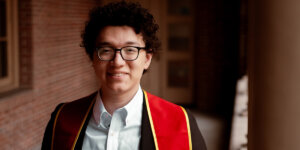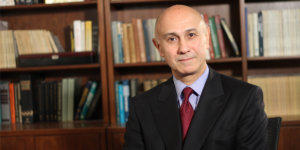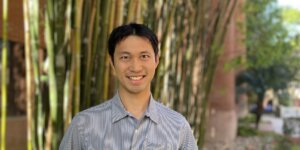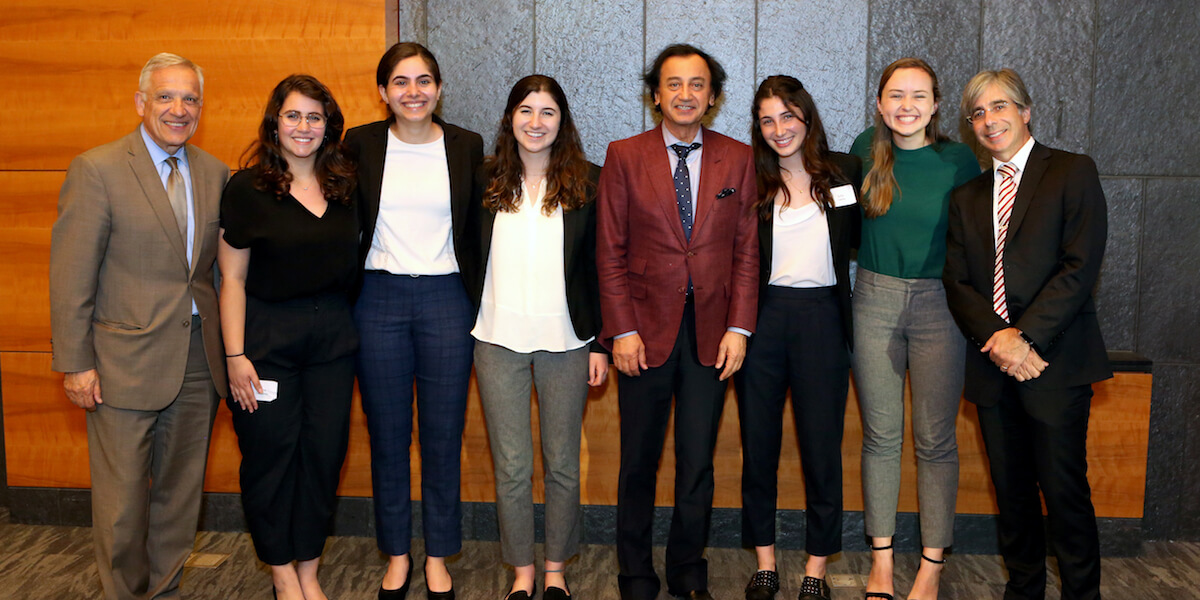
Marlink (Left to right) Dean Yannis C. Yortsos, Marlink co founder Maria Camasmie, co founder Roxanna Pakkar, cofounder Siena Applebaum, Fariborz Maseeh, co founder Sofia Tavella, co founder Celeste Goodwin, and MEPC Director Gianluca Lazzi (Photo/Nicolas Sage)
Over the past nine years, the Maseeh Entrepreneurship Prize Competition, or MEPC, has, in the words of USC Viterbi School of Engineering Dean Yannis C. Yortsos, become “a very important launching pad for a number of successful companies.”
Thermal View Monitoring, the 2017 winner, has developed an image guidance system that provides a real-time, 3-D temperature map during thermal ablation therapy. Unlike with MRIs and CTs, physicians could take quality images right in the operating room, saving significant time and money. AesculaTech, that year’s runner up, develops and manufactures a platform of temperature-responsive smart materials for use in medical devices, including the treatment of dry eye. After MEPC, AesculaTech received an invitation to Y Combinator, the famed Bay Area business incubator.
The 2015 champ, BIRS, leverages proprietary eye-tracking software for a quick and objective concussion assessment. Second Spectrum, the 2013 victor, analyzes Big Data for insights into sport performance, such as what constitutes good defense and offense in basketball. Currently, all 30 NBA teams receive Second Spectrum optical tracking data, which powers next-generation analytics.
MEPC, founded in 2010 with a $1 million endowment from entrepreneur Fariborz Maseeh, has become one of the premier business model contests for USC Viterbi and other students, faculty and would-be business builders. Through workshops, customer discovery grants, and other support, MEPC provides participants with a solid platform on which to build potentially thriving businesses.
Marlink, one of the first, if not the first, all-women undergraduate teams to compete in MEPC, is the latest promising student team to emerge from the contest.
On Tuesday, March 26, at Ronald Tutor Hall, Marlink took home the silver at the ninth annual MEPC. The burgeoning startup is developing an underwater exploration device that allows information to be transmitted and received between AUVs and scientists. The benefit: Marlink’s device reduces the need for periodic resurfacing and vehicle retrieval, which drastically simplifies operations and reduces costs.
Four of Marlink’s five members, Celeste Goodwin, Maria Camasmie, Sofia Tavella and Siena Applebaum, major in mechanical engineering, while Roxanna Pakkar studies electrical engineering.
The team will be one of 13 teams competing on April 23 in the Western regional finals of the National Academy of Engineering’s Global Grand Challenges Student Competition in Irvine. Four days earlier, in Washington D.C.. 15 teams will duke it out in the Eastern regionals. The top five will advance in September to the Global Grand Challenges finals in London, along with five teams from the U.K. and China.
Marlink members agree that they benefited greatly by participating in MEPC.
“This has made me more confident in future entrepreneurial pursuits and in how to take a product from conception to fruition,” said Applebaum, a USC Viterbi junior. “I think it’s a really wonderful program.”
This year, 38 teams applied for 15 slots in MEPC, which kicked-off in November. The field was whittled down to five finalists on March 1.
Teams competed for over $100,000 in cash and business and legal services offered by Stubbs Alderton & Markiles, LLP, a business law firm.
“The teams we had were remarkably strong and diverse,” said Gianluca Lazzi, the MEPC director. “I’ve been so impressed with their ability to come up with interesting, new applications.”
Added Maseeh: “I think all of them [the finalists] could be viable businesses.”
The 2019 MEPC winners include:
1st Place –AIRBOND
2nd Place – Marlink
3rd Place – ParkMeter – real-time detection of available parking spaces with hardware sensors that are networked via the Internet
4th Place – Amplify – at-home speech therapy provided through audio-based adventure games
5th Place – BeatStyle – a mobile recording studio that allows users to discover instrumentals to rap or sing lyrics over
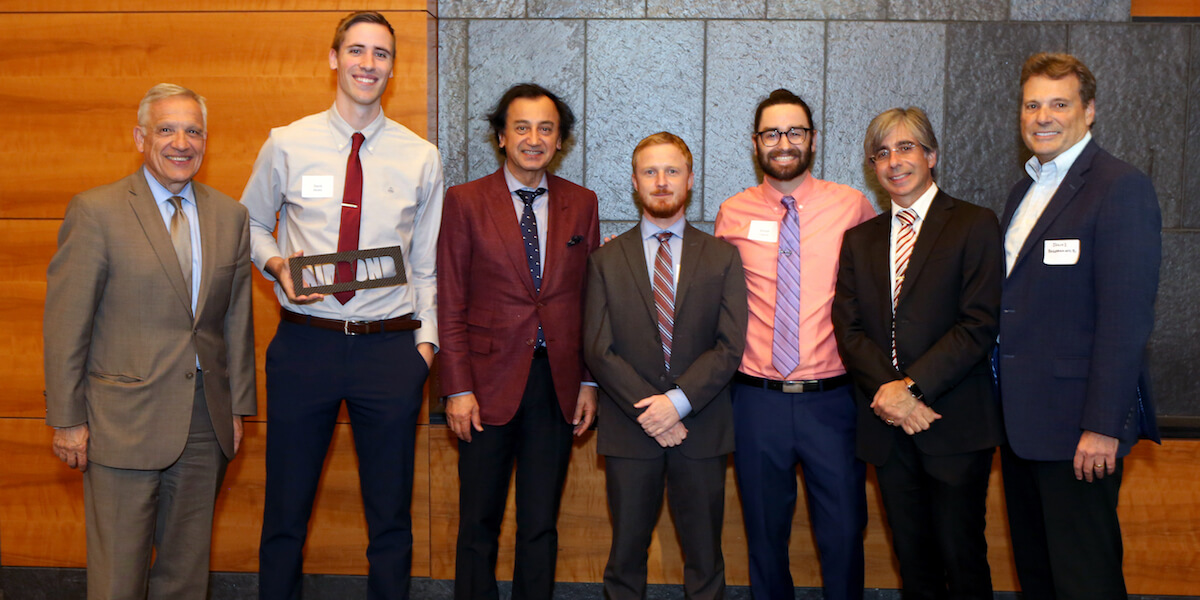
AIRBOND (Left to right) Dean Yannis C. Yortsos, co founder David Bender, Fariborz Maseeh, co founder Mark Anders, co founder William Edwards, MEPC Director Gianluca Lazzi, and Mentor Julius Bogdanowicz (Photo/Nicolas Sage)
AIRBOND, which has devised a more efficient and cheaper way to produce carbon fiber composite materials for the aviation and other industries, took home the $50,000 grand prize, plus $20,000 in free legal services. By selectively coating resin on dry carbon fibers instead of laminating it over the entire surface, manufacturers can produce carbon fiber composites without having to pressurize the materials. That means no need for expensive autoclaves.
The result, according to AIRBOND cofounder William “Bill” Edwards, a Ph.D. candidate in mechanical engineering: aerospace companies could open new production lines for an “85 to 90 percent cost savings compared to autoclave expansion.”
Over the course of five months, MEPC teams attended six workshops about customer discovery, financials, intellectual property and distribution channels. Participants also practiced and received feedback on their presentations. The National Science Foundation Innovation Corps (“I-Corps”) program, the nationally recognized lean startup program focused on technology commercialization, sponsored the seminars.
Distinguished instructors included Provost Professor Lazzi, who holds a joint appointment at USC Viterbi and the Keck School of Medicine of USC; USC Viterbi’s Alice Liu, director of the Viterbi Startup Garage, who also served as the architect for the MEPC program, guiding the teams as they progressed through the rigorous selection stages; Pai-Ling Yin of the Lloyd Greif Center for Entrepreneurial Studies at the USC Marshall School of Business; and Kevin DeBré, head of the intellectual property and technology transactions practice at Stubbs Alderton & Markiles, an MEPC sponsor.
Competition participants said they found the educational sessions valuable.
“They were incredible,” said Applebaum of Marlink. “There was a great session by a lawyer about intellectual property, which is something I know nothing about. I also learned how to create a compelling narrative for the pitch.”
Added AIRBOND’s Edwards: “The competition encouraged us to formalize our idea and gave us the opportunity to learn about critical business aspects of developing a company, including customer discovery, that we, as technical specialists, had limited exposure to.”
To help participants better understand potential customers’ problems and how they might address them, several teams received financial support for customer discovery.
Lazzi said that win or lose, the process of going through MEPC should help all participants, especially those from USC Viterbi.
“Whether they decide to start their own companies or not, any engineering student will benefit from learning about business concepts, understanding the value proposition of what you’re doing, what customers want, and how much to charge for a product,” he said. “Students no longer just live in the classroom. There’s incredible value in having them express themselves and put into practice what they’re learning.”
Published on April 5th, 2019
Last updated on May 14th, 2025




